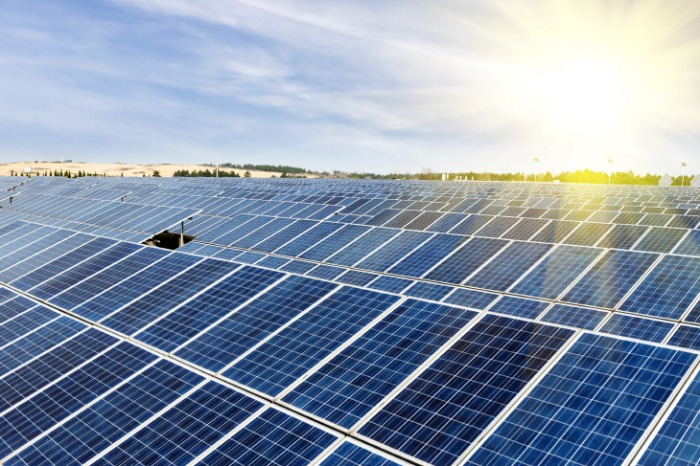Energy
US OKs Chinese-made solar modules using materials of S.Korea's OCI
This development has fueled prospects of higher sale prices for LONGi Group panels using OCI-produced polysilicon
By Sep 25, 2023 (Gmt+09:00)
1
Min read
Most Read
LG Chem to sell water filter business to Glenwood PE for $692 million


Kyobo Life poised to buy Japan’s SBI Group-owned savings bank


KT&G eyes overseas M&A after rejecting activist fund's offer


StockX in merger talks with Naver’s online reseller Kream


Mirae Asset to be named Korea Post’s core real estate fund operator



The US has approved the import of Chinese-made solar panels using polysilicon from South Korea's green and energy company OCI Holdings Co.
Pundits say the sale prices of OCI's products will rise further as Chinese module companies begin to seek polysilicon manufactured elsewhere. The South Korean company has thus put operations at its Malaysian plant in overdrive.
Industry sources on Sunday said US Customs and Border Protection (CBP) approved the import of solar panels from China’s LONGi Green Energy Technology Co. made with the solar energy material polysilicon produced in Malaysia by OCI Holdings.
South Korean-made materials were used in the wake of American sanctions on Chinese materials under the Uyghur Forced Labor Prevention Act. In July, LONGi modules made with polysilicon from China's Tongwei Group failed to pass US customs, causing a big stir in the industry.
Experts say OCI Holdings' products have received de facto customs certification from CBP.
“This makes it official that even Chinese-made modules can enter the US if they use OCI's polysilicon,” an industry source said. “Select volumes of OCI Holdings products were not subject to prices of items not produced in China, but sale prices are expected to surge.”
Polysilicon is a basic material for solar energy, with the sector's ecosystem structure in the order of polysilicon → ingot → wafer → cell → module.
In 2021, OCI Holdings formed ties with LONGi through conclusion of a three-year contract on polysilicon supply worth 900 billion won ($673.8 million). For the Chinese company to open routes for such rapidly growing exports to the US, analysts say, it must cut the proportion of Chinese-made polysilicon used.
This thus greatly raises the prospects of another long-term deal for OCI. Just three non-Chinese companies make polysilicon: OCI Holdings of South Korea, Wacker Chemie of Germany and Hemlock Semiconductor of the US.
When the European Union next year implements its Corporate Sustainability Due Diligence Directive and reinforces regulations on human rights and the environment, the share of Chinese products on that market is expected to further decline.
Write to Hyung-Kyu Kim at khk@hankyung.com
More to Read
-

-
 Chemical IndustryOCI to jointly produce polysilicon for chips with Japanese company
Chemical IndustryOCI to jointly produce polysilicon for chips with Japanese companyMay 24, 2023 (Gmt+09:00)
1 Min read -
 EnergyOCI to expand polysilicon line, buy back shares to boost corporate value
EnergyOCI to expand polysilicon line, buy back shares to boost corporate valueMar 19, 2023 (Gmt+09:00)
5 Min read -
 EnergyOCI to invest $40 million to expand US solar module production facilities
EnergyOCI to invest $40 million to expand US solar module production facilitiesOct 24, 2022 (Gmt+09:00)
1 Min read
Comment 0
LOG IN


